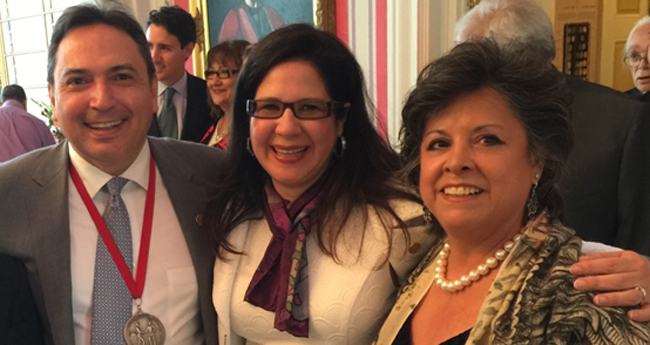Wesley-Esquimaux inducted as honourary witness at TRC closing ceremonies

By Rick Garrick
THUNDER BAY – Chippewa of Georgina Island’s Cynthia Wesley-Esquimaux is continuing her Truth and Reconciliation journey as a member of Governing Council for the National Centre for Truth and Reconciliation.
“The centre is there to bring in all the records, whether it was from the adjudication process, the Aboriginal Healing Foundation, the Truth and Reconciliation Commission’s work across Canada, the government’s records or the individuals’ records,” says Wesley-Esquimaux, vice provost Aboriginal Initiatives at Lakehead University. “The centre’s job is to get all those records digitized so every university across Canada has access through computers so their students can do further research.”
Wesley-Esquimaux was inducted as one of 80 honourary witnesses at the TRC’s closing ceremonies on June 2.
“It was an honour — it’s a lifetime commitment,” Wesley-Esquimaux says. “Our job and our goal is to bring people together wherever we go by teaching and building understanding and working to smooth the pathway to better relationships.”
Wesley-Esquimaux has been involved in bringing people together since the inception of the Aboriginal Healing Foundation about 14 years ago. She had previously been working with First Nation communities on a number of related initiatives.
“My research at (the University of Toronto) was about reconciliation in so many ways as well — although it was not about Indian Residential Schools, but the impacts of historic trauma,” Wesley-Esquimaux says. “All of those pieces are part of this larger conversation. In some ways, it is a journey every Indigenous person has been on from the time they were born, this process of understanding what has happened to their community infrastructure and then moving towards reconciliation in a good way or not sometimes.”
Wesley-Esquimaux has since strived to be the eyes and ears for First Nations people without direct access to media.
“There are many of us across the country that act as voices for those people living in communities and in different circumstances that don’t have access to media,” Wesley-Esquimaux says. “It’s about being able to be a voice for people and being able to be available to answer those questions and create a conduit of conversation between national media, sometimes provincial media and the people in the community who are the ones living the experience.”
Wesley-Esquimaux says many people are actively traversing the country, including political representatives, teachers, healers, academics, students and others, who care enough about humanity to put their time into creating a growing base of support and change for the future.
“Since Oka happened in 1990 and the Aboriginal community was pushed onto the world stage and became a part of the larger conversation, we have been a very powerful voice and a force for change,” Wesley-Esquimaux says. “So we are now experiencing that change. By being a part of the larger conversation, that has contributed to people in Canada understanding there is a need for people to sit up and pay attention to the fact that we are not going anywhere. And history has to be corrected in the present; we need to move forward in a good way.”
Wesley-Esquimaux co-founded the Canadian Roots Exchange in 2008 with two non-native University of Toronto students who wanted to know more about First Nations people in Canada. The organization provides opportunities for non-native and native Canadians to get to know each other better.
“I know lots about the world but I don’t know anything about Aboriginal people in Canada,” Wesley-Esquimaux says, quoting the students. “So is there a way we can work together to create that knowledge base.”
Wesley-Esquimaux and a group of Canadian Roots Exchange members, including David Berkal and Ronan MacParland, participated in the opening TRC art project at Rideau Hall in 2009. The Canadian Roots Exchange was also present when the TRC closed its doors this past June.
“The Canadian Roots Exchange brought in 100 young people from Toronto to go on the walk,” Wesley-Esquimaux says. “And 15 of them stayed and worked on the education component.”
Wesley-Esquimaux says First Nations people have witnessed many positive social and economic changes during her lifetime, including education achievements and the recognition of their traumatic past by governments and people in Canada.
“It is a very good time to be Indigenous.”

